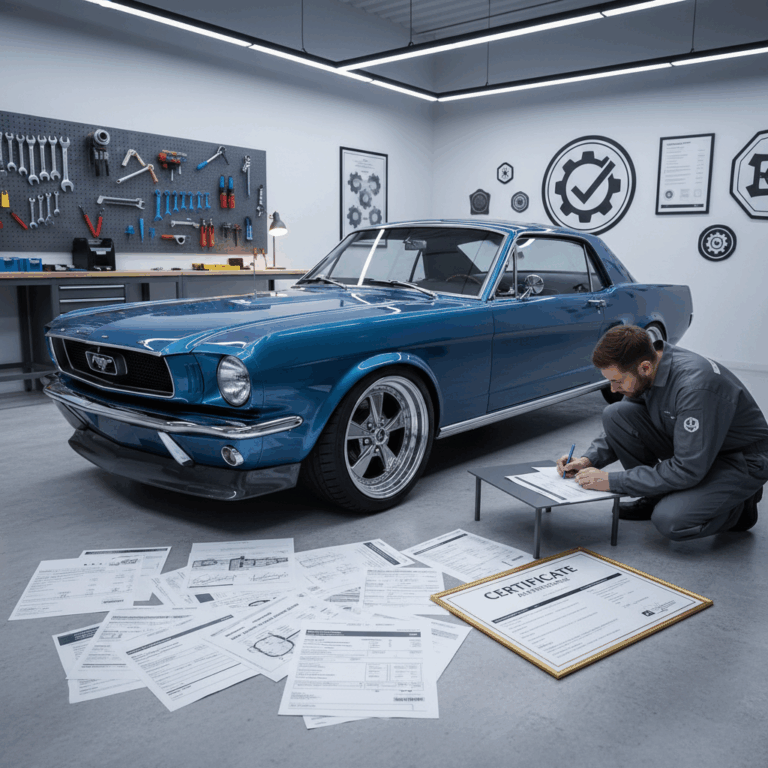Legal Requirements for Car Customization in Spain
When customizing a car legally in Spain, having the correct documentation is essential. This ensures compliance with laws and maintains vehicle safety on the roads.
Proper paperwork is necessary to officially approve modifications and avoid legal issues. These documents prove that changes meet regulations.
Vehicle owners must carefully prepare and present all required documents to comply with Spanish laws concerning car modifications.
Detailed Technical Project
The Detailed Technical Project outlines every modification made to the vehicle. It must be created by a qualified technician and include specifics about the car.
This document contains details like brand, type, variant, commercial name, identification number, and license plate. It’s critical for legalizing modifications.
Without this project, authorities cannot verify the nature of changes, making it a fundamental requirement for customization approval.
Compliance Report
The Compliance Report certifies that the modifications meet current regulations and do not compromise vehicle safety. It is issued by authorized technical services or the manufacturer.
This report assures authorities that the car remains safe after modifications and complies with legal standards. It’s mandatory for homologation processes.
Obtaining a Compliance Report protects owners from legal risks and confirms that the vehicle modifications are safe and authorized.
Essential Certification Documents
Proper certification documents are crucial for legally validating car modifications in Spain. These papers confirm that changes meet safety and regulatory standards.
Without the correct certifications, your vehicle may face legal issues or fail inspections. Each document serves a specific purpose in the approval process.
Ensuring all certification documents are in order helps guarantee your customized car is roadworthy and recognized by authorities.
Workshop Certificate
The Workshop Certificate is issued by the mechanic or garage that performed the modifications. It certifies that all works were done following technical and safety standards.
This document includes details of the changes and asserts that the workshop is officially responsible for executing the modifications correctly.
It provides legal proof that experienced professionals completed the customization, which is vital for the inspection and approval stages.
Technical Laboratory Report
A Technical Laboratory Report is necessary when modifications require homologation. It comes from an authorized lab that tests and verifies the changes comply with regulations.
This report confirms that modifications do not compromise the vehicle’s safety or environmental standards, ensuring the car remains fit for use on public roads.
Obtaining this report is mandatory for specific upgrades and helps demonstrate adherence to Spanish vehicle safety laws.
Manufacturer or Authorized Service Certification
The Manufacturer or Authorized Service Certification attests that modifications are approved or supported by the vehicle maker or their official service center.
This certification guarantees that the parts or changes meet original quality and safety standards set by the manufacturer, adding credibility to the modifications.
Having this document helps prevent legal complications and supports the vehicle’s continued warranty and insurance validity after customization.
Process of Vehicle Inspection and Homologation
After gathering all required documents, the next step is to have your customized vehicle inspected at an ITV station in Spain. This process ensures all modifications comply with safety standards.
The ITV inspection verifies that changes meet environmental and technical regulations before allowing the vehicle back on public roads. It’s a crucial step in legalization.
Successful inspection leads to official registration of these modifications in the vehicle’s technical file, completing the homologation process under Spanish law.
ITV Station Verification
The ITV station is responsible for physically verifying the modifications made to the vehicle, checking them against submitted documentation. This ensures safety and regulatory compliance.
Inspectors assess the vehicle’s system, emissions, and structural integrity to confirm that the changes do not compromise performance or roadworthiness.
This verification is mandatory and must be passed before registering any modifications. Without ITV approval, the vehicle cannot be legally used on Spanish roads.
Registration of Modifications in Vehicle Technical File
Once ITV verification is complete, all modifications must be officially recorded in the vehicle’s technical file held by traffic authorities. This formalizes the approval.
Updating the technical file is essential to reflect changes, preventing legal issues during future inspections or transfers of ownership.
Proper registration offers legal protection and proof that the vehicle complies with safety standards after customization. It completes the homologation process.
Risks of Non-Compliance
Failing to comply with legal requirements for car customization in Spain can lead to serious consequences. It is essential to understand the risks involved when modifications are not properly documented or approved.
Non-compliance may result in fines, legal complications, and difficulties with insurance claims. Ensuring all documentation is complete helps avoid these issues.
Vehicle owners should prioritize following regulations to protect themselves from penalties and maintain the safety and legality of their customized car.
Potential Fines
One of the main risks of non-compliance is facing monetary fines. Authorities impose these fines when modifications lack the required technical project or certification documents.
The amount can vary depending on the severity of the infraction and the nature of the unauthorized modifications to the vehicle.
Fines serve as a deterrent to prevent illegal car modifications that could compromise road safety and regulatory standards.
Insurance Issues in Case of Accident
Insurance companies may refuse to cover damages if a customized car lacks proper approval and documentation. This can leave owners financially responsible after an accident.
Without homologation or certification, insurers consider the vehicle non-compliant, leading to claim denials or reduced compensation in case of accidents.
Maintaining all legal documents protects owners by ensuring valid insurance coverage, which is vital for financial and legal security on the road.







